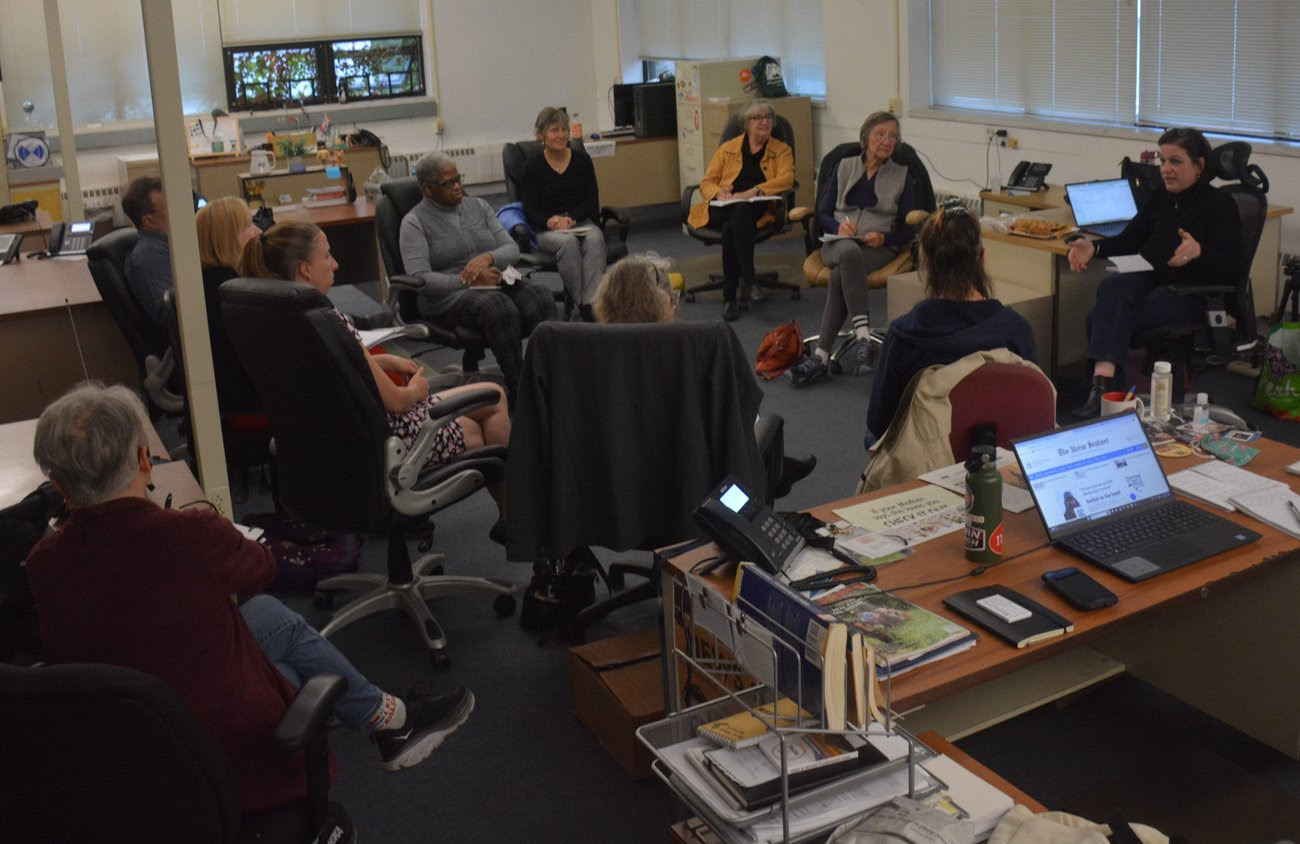Editor’s Note: This article is part of an ongoing series taking a deeper look at the Civic Health Index and what it means for Granite Staters.
By Kylie Valluzzi, Granite State News Collaborative
Kathy Nichols, a Dublin resident, has been subscribing to the Monadnock Ledger-Transcript since she moved to New Hampshire 20 years ago.
In 2023, she went through the Civic Documenters program — a pilot initiative that trains New Hampshire residents to document local government meetings and support local journalism — to contribute to the Ledger-Transcript.
“I've always been a newspaper reader, and I like my local news to know what's happening in my community,” Nichols said. “I love different stories in the paper and learning about what's happening in other towns.”
Nichols’ experience with the Civic Documenters program not only deepened her understanding of local governance but also reinforced her trust in local media.
Violet Schuttler , Associate Producer, The Marlin Fitzwater Center For Communication
Franklin Pierce University, sits in the control room at the Fitz studios. (Photo Credit, Luke Newman for The Marlin Fitzwater Center)
“The right-to-know law information was really interesting to me,” she explained. “They had a lot of case studies that go back years, and it just kind of astonished me because I've always thought, why would a select board or a planning board not give you the information that's supposed to be public? And lo and behold, over the years, that's exactly what's happened. So it was good to learn about it and see what was going on. I appreciated it.”
However, trust in local media is not universal. According to the University of New Hampshire Carsey School of Public Policy’s 2024 Civic Health Index, 60% of New Hampshire residents said they trust local media either some or a lot. The percentage is actually up slightly compared to 2019 and 2001, when it was 54% and 58% respectively.
These findings are similar to a 2022 national report from Pew Research Center that found that 71% of adults sampled have some or a lot of trust in the information they get from local news media. The same report found that trust in national media was 10 points less.
People tend to trust local media more because “they have the opportunity to validate it,” said Dr. Kimberly Lauffer, who was not affiliated with the poll but teaches journalism and public relations at Keene State College. “They see [the stories], it’s people they know who are quoted, it’s on topics that are of really important interest to them, things that affect their daily lives.”
Annmarie Timmins, speaks about the state of local journalism for the digital NH PBS series The State We’re In (Credit NHPBS)
Annmarie Timmins, a journalist for New Hampshire Bulletin, has stayed in local news for more than a quarter-century — including 25 years with the Concord Monitor, a daily newspaper — because of this opportunity to build community rapport. The Bulletin is a nonprofit, online-only news source.
“I do hear from a reader when I get it wrong, either by email or they see me at the gym or at Home Depot, and I hear about it — the good and the bad. I feel lucky to have that; as painful as it is sometimes, I feel really fortunate to have that kind of relationship. I think that makes a huge difference [in trust],” Timmins said.
Local news is also perceived as more trustworthy because opinions are clearly labeled, Lauffer said, while in national news, analysis pieces often blend facts with interpretation, making it harder for readers to distinguish between fact and opinion. This blurring of lines, especially on cable networks such as CNN, MSNBC and Fox, contributes to the perception that local news is more trustworthy than national news.
Nichols said one of the strengths of local media is its ability to cover the intricacies of small-town governance, something she witnessed firsthand.
“There’s just so much information that the local paper has been able to provide to people and keep them informed about meetings and what was going to happen,” she said, referring to a recent issue in Dublin where the regional school district considered closing local elementary schools as a cost-saving measure. “I think that got a lot more people interested in the paper.”
Political party affiliation seems to have an impact, with liberals more likely to trust local news than conservatives and libertarians, according to the Civic Health Index.. People with postgraduate degrees also exhibit higher levels of trust than those with a high school education or less.
The Civic Health Index utilized data from the January 2024 Granite Poll Survey, a web-based survey by the University of New Hampshire Survey Center, which gathered opinions from 1,864 randomly selected New Hampshire residents. Additional data was sourced from the U.S. Census Bureau's Current Population Survey.
Financial viability
However, a significant challenge looms over local newspapers: The erosion of trust in media is leading to a decline in readership and, subsequently, the financial viability of these outlets.
Three major U.S. newspapers — The Wall Street Journal, The New York Times and USA Today — collectively lost more than 500,000 print subscribers from 2020 to 2021, according to a 2024 report from Redline Digital, a digital PR agency.
That loss is part of a broader trend in which newspaper industry revenue plummeted by 52% from 2002 to 2020, a decline largely attributed to diminishing trust in the media.
Granite Beat graphic courtesy The Laconia Daily Sun
Yet, despite the downturn in print subscriptions, some major news outlets have successfully transitioned to digital platforms, drawing in substantial numbers of digital readers. The New York Times, for example, reported almost 10 million digital-only subscribers by the end of 2023, highlighting a shift in how news consumers engage with content. This digital success offers a blueprint for local outlets looking to adapt to changing reader habits, though replicating such models on a smaller scale remains a challenge.
There has also been a real push to set up online-only, nonprofit news organizations. For example, the Institute for Nonprofit News, a consortium of nonprofit news organizations, has grown from a few dozen members in 2009 to about 450 members now.
Nonprofit news organizations in New Hampshire include Timmins’ organization, New Hampshire Bulletin, and the New Hampshire Center for Public Interest Journalism, and the organization publishing this report, the Granite State News Collaborative.
As fewer people subscribe or support local media, the newspapers are forced to cut back on coverage, which only deepens the cycle of mistrust and disengagement. The newspaper industry is projected to lose $2.4 billion in ad investments between 2021 and 2026, further threatening the survival of local news outlets.
"Not trusting the media is a form of it disappearing," Timmins said. "And when that happens, democracy suffers."
Lauffer said that if local media ended the practice of endorsing candidates, and instead issued voter guides and other forms of unbiased government coverage, it would be seen as less polarizing.
A matter of trust
National media can amplify polarization by highlighting extreme viewpoints to create conflict, but local solutions journalism can help shift the focus toward resolving issues.
That form of journalism focuses on in-depth reporting about how people are trying to solve particular problems, and the lessons that can be learned from successes and failures.
Despite differences in approaches and politics, many people share similar values and goals, Lauffer said, suggesting that disagreements are often about methods rather than the underlying objectives.
Nichols, reflecting on her experience as a Civic Documenter, emphasized the importance of community involvement in fostering trust.
“One of the things that I have found helpful is I’m more aware of it now that I got involved in this,” she said. “If I see a local reporter at an event, I think it’s important. If I’m a parent, or if I’m a person in my town, and I see a story about my local library or about the parade in town, and it’s done in a positive way, I think that builds a relationship between me and the news outlet. That’s terrifically important.”
One of the biggest impacts of a lack of trust in local media is that people who don’t trust it are less likely to support it. They’re less likely to be subscribers, to want to participate in it as a news source or to send in a letter to the editor.
Lauffer said her mother, for example, stopped subscribing to her local newspaper in Michigan, which covered three counties.
“They have many different local governments, school systems, local employers, and they have like five reporters to cover that massive geographical area,” Lauffer said. “There’s no way they can do it effectively, and if a local medium isn’t covering its area effectively, then people don’t see themselves represented and they are less likely to purchase subscriptions.”
The inaugural class of Civic Documenters meets in The Sentinel's newsroom Tuesday evening with editors from The Sentinel, the Monadnock Ledger-Transcript and Granite State News Collaborative. (Jack Rooney / Sentinel Staff)
To help build trust with readers in New Hampshire, Timmins works to ensure that all sides of every story are heard, or at least given the chance to speak.
“When [the Bulletin] launched, people assumed we were liberal media,” Timmins said. “I don't know why, but I've worked hard to forge relationships with the people in, say, the Legislature, who do have that view, so I could establish a personal relationship. That's been an intentional effort on my part to get to know them and to tell them after every call, ‘If I get this wrong or you feel misrepresented, call me. I want to hear about it.’”
She also advocates engaging with different audiences through various platforms, such as social media and live-streamed conversations, to ensure broader community representation.
Lauffer similarly emphasized the importance of seeking out diversified sources and covering a wide range of topics that affect different parts of the community. She also highlighted the value of engaging directly with the public through newsletters, listening sessions, and focused discussions with various constituencies to enhance the public’s understanding of and trust in local journalism.
“Trust has changed, but I’m not in despair yet,” Timmins said. “I think the opportunity here to gain someone’s trust is pretty significant. And I do think local media here has earned that trust and, for the most part, does have it.”
These articles are being shared by partners in the Granite State News Collaborative. For more information, visitcollaborativenh.org.




